Driving aid into Ukraine 'to make a difference'
"I work seven days a week when I'm here because I want to get back out there and help make a difference."
For the past three years carpenter Matt has been delivering aid to the city of Sumy, which is on the front line of the war in Ukraine.
Every six weeks he makes the 2,000-mile (3,219km) trip from his home in Oxfordshire, working extra days so he can afford to regularly drive to the warzone.
Matt believes in the importance of standing with the people of Ukraine "where they're experiencing all these problems, and letting them know that you're by their side".
In 2022, Matt saw a video online which showed a Russian tank drive over the top of a car driving in the opposite direction, and afterwards he "couldn't stop thinking about it".
He resolved to collect medical aid locally, making the arduous trip into Ukraine via the Channel Tunnel and through several countries while "everybody was coming the other way".
He says: "We drove in and managed to meet people and share some aid out and help a little bit and it started there."
Matt works with a group of local school parents who raise money for medical and surgical equipment.
He and his team distribute aid to five hospitals in Sumy, then leave the vehicles at the frontline, to be repurposed as ambulances, troop carriers and assault vehicles, before hitch-hiking home.
"When we're dropping off in Sumy, we speak to the doctors and the surgeons in the hospitals," Matt says.
"The day I get back, we start again. We're on it and we've got a list. We know what they really, really need."
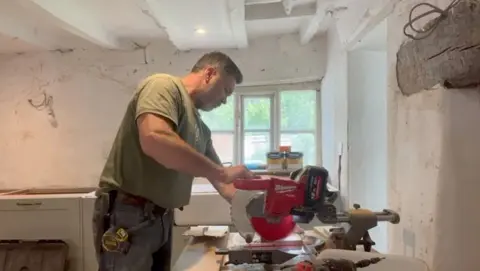
Matt's wife, who we are not naming in this feature, says her husband previously mentioned travelling to Ukraine in passing but one night broke the news over dinner that he was going the next day, which was a "massive shock".
She says: "It was really hard because at that time, it was so unknown... it was quite scary because I didn't know what was on the other side.
"He was away the first trip, either four or five days, it was really quick. And he literally drove without stopping and drove straight back, he was exhausted."
She adds: "I had no communication with him.
"Once he'd got across the border, I didn't hear anything else. So it was a waiting game."
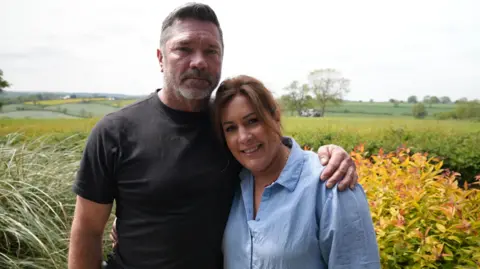
Anna and Iryna, who have been working with Matt from their Oxfordshire base, say as the humanitarian crisis in Ukraine unfolded they knew they wanted to help.
They have accumulated about £1.5m through fundraising and donations since 2022.
"There was one morning when nobody heard from Matt," Iryna recalls.
"We are sitting and thinking 'Where is he? Where is he?' And then eventually Matt pings a message and you're like, 'phew'.
"It's not easy. He is almost like a member of the family... we've adopted Matt."
Anna says: "It's really tricky because Matt's a grown man and he's really sensible, and we know that he's going to look after himself and he's not going to do anything stupid... and we know he's got some great, great friends out there.
"You've just got to trust and hope that he's not going to be one of the unlucky ones that gets hit. You know, what more can we do?
"We're always on slight edge when he is out there. We are always slightly anxious."
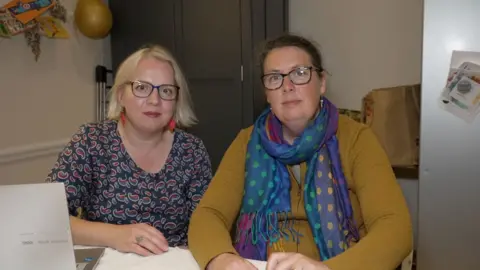
The Foreign, Commonwealth & Development Office advises against all travel to Sumy.
It also says there is an "ongoing risk of harm to British nationals from Russian attacks across all of Ukraine", including from "missiles and drones that hit unintended targets or from falling debris".
"We keep our travel advice under constant review to ensure it reflects the latest updated information for British nationals travelling abroad," a spokeswoman said.
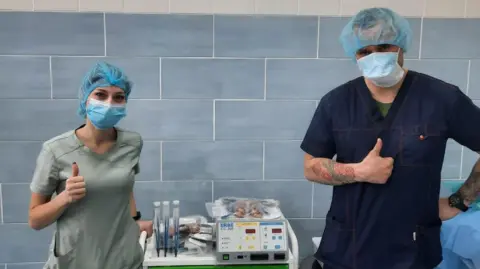
Iryna's cousin is a trauma surgeon in Ukraine who was having to use household drills during surgery to "put metal plates in people's bodies".
"They had absolutely not been prepared for this," she says about Russia's full-scale invasion.
"We send a lot of out of date medication, which otherwise would go to landfill, which absolutely is life-saving in Ukraine."
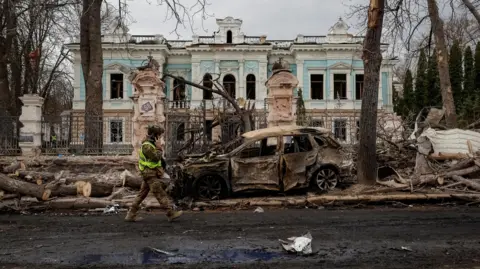 Reuters
ReutersMatt shows the BBC around his 4X4 to show what else is being transported on his latest expedition.
It is stacked with crutches, Zimmer frames, wheelchairs, tourniquets, bandages and handheld ultrasound scanners, which can be used to detect internal bleeding and shrapnel.
There is paracetamol and some veterinary equipment too, which he says is "dual purpose".
"If it's syringes and stuff like that, you can use it on humans as well... if you're desperate, then you make things work."
Matt has been known to bring protein shakes in the summer, handwarmers in the winter and even a bit of cake to brighten spirits.
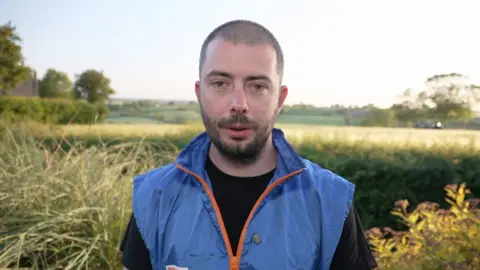
Yevgen is Matt's local contact, and sometimes joins him in a convoy on his travels.
He owns a garage but since the conflict has been busy fixing military vehicles.
"I can say it's life now," he says.
"I cannot believe people from a far away country just keep supporting us. They do a big thing."
He calls Matt a "friend for life".
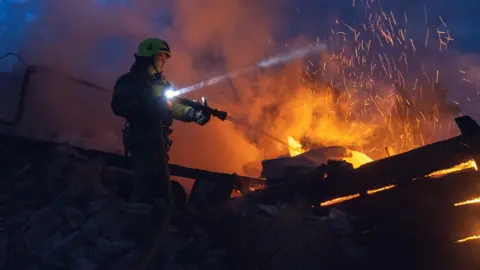 Reuters
ReutersMatt's wife says he "doesn't talk to me about guns, he doesn't talk to me about warfare or anything like that, because I can't deal with that".
"I probably reconcile it in my head with the charitable stuff that he's doing," she continues.
"When he's going to the hospitals, or the orphanage, or to see the things that they've set up for the children out there... I think that's what probably helps me to kind of not lose it every time.
"But he doesn't talk to me about war. He talks to me about the people, and that's probably what pulls me forward each time."
Matt, Anna and Iryna have been awarded medals from the Ukrainian government for services to the country during the war.
Matt says their mission is not just about providing the physical aid but about bringing a "bit of hope".
"If you can imagine saving someone's life, I mean, that's got to be the ultimate thing for a human being."
You can follow BBC Oxfordshire on Facebook, X (Twitter), or Instagram.
